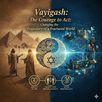Vayera-Sacrifice & Survival: Are They Mutually Exclusive
- Rabbi Yosef Vogel
- Nov 15, 2019
- 2 min read

This past Sunday after I attended morning prayers at the synagogue, a middle aged man from Israel asked to make a personal appeal. He explained that his wife had been diagnosed with a life threatening illness and was asking the community for financial support.
Immediately I reminded myself of a stark passage in the Talmud regarding an ethical dilemma: “If two people are walking on a desolate path and there is a jug of water in the possession of one, if both drink, both will die, but if only one of them drinks, he will survive. The ruling follows the opinion of Rabbi Akiva who taught: “And your brother shall live with you,” indicating that your life takes precedence over the life of the other.” The first Lubavitcher Rebbe derives a most illuminating insight. He explains that it is only one jug of water which one can keep for themselves. However anything beyond this is considered “excess”, which one is then obligated to share with someone who’s survival depends on this. In this week’s Torah portion we read about our patriarch Abraham. The Midrash teaches us that He was the personification of “kindness”. However, what makes him unique in the annals of history was the degree of “sacrifice” he was willing to make in order to help others. The verse explains that the reason G-d chose Abraham as the first Jew was because he instilled these values in his descendants. The words used to describe his kindness is “to do charity and justice”. The Rebbe explains that the example Abraham set for his children was not just to give “token charity” but to provide a “just charity”. This can only be achieved by first distinguishing between what you “need” for yourself and family and what belongs in the realm of “excess”. The keyword in describing our ethos as Jews is “sacrifice”. It is completely counterintuitive to secular conventional thinking. It goes against our core natural instincts. However, it is the secret to our Jewish survival. To the degree we make sacrifices to help those who are in real need, we become embedded in the spirit of those timeless values. This is the only way to ensure that we are the link in the chain between the past and the future.





